Reviews
AFF Review: Hardy

Boxer Heather "The Heat" Hardy lives with her parents, sister, nephew and her own young daughter in a working-class Brooklyn neighborhood. She trains with her trainer/boyfriend Devon at the famed Gleason's Gym and dreams of making a full-time career out of fighting and moving out of her current crowded living situation. In the documentary Hardy, from first-time filmmaker (and Austin native) Natasha Verma, the boxer asserts, "I don't wanna get paid like a female, I wanna get paid like a boxer."
The film shows Hardy's path toward signing with a big-time promoter and making more money. In 2012, boxing became the last sport at the Olympics to accept women, and Verma's film displays some aspects of the macho culture still involved in the sport. Posters plugging fights for the male athletes adorn the gym, while Heather is responsible for selling a certain portion of tickets to her bouts. As she waits impatiently before one of her fights, rapper 50 Cent comes into the dressing room full of mostly men and makes disgusting jokes about domestic violence and women who fight back.
AFF Review: One Eyed Girl
,-Mark-Leonard-Winter-(middle)-and-Matt-Crook-(right)-in-One-Eyed-Girl-photo-courtesy-of-Projector-Films.jpg) Writer and director Nick Matthews made his feature debut at this year's Austin Film Festival with One Eyed Girl, a riveting psychological thriller that takes place in South Australia but could just as easily occur anywhere. Co-written by co-star Craig Behenna (The Babadook), this film -- which just won the AFF 2014 jury prize in the "Dark Matters" category -- slowly reveals the layers of pain and guilt experienced by a psychiatrist and the unexpected rocky path to redemption and salvation.
Writer and director Nick Matthews made his feature debut at this year's Austin Film Festival with One Eyed Girl, a riveting psychological thriller that takes place in South Australia but could just as easily occur anywhere. Co-written by co-star Craig Behenna (The Babadook), this film -- which just won the AFF 2014 jury prize in the "Dark Matters" category -- slowly reveals the layers of pain and guilt experienced by a psychiatrist and the unexpected rocky path to redemption and salvation.
Travis (Mark Leonard Winter) is a thirtysomething psychiatrist severely damaged by the death of former patient Rachel (Katy Cheel). Through a series of flashbacks, we learn that Travis' relationship with Rachel extended beyond and was impacted by her mental health. Travis' inability to connect to his patients and Rachel is compounded by the desensitization to the violence and corruption of the modern world, as well as a refusal to accept his own identity. He is emotionally lost and on the brink of a nervous breakdown when he meets the mysterious teenager Grace (Tilda Cobham-Hervey), who's handing out brochures about a charismatic leader, Father Jay (Steve Le Marquand).
Review: Birdman
 Although Michael Keaton has stated the personality of his character Riggan Thomas is the most dissimilar to himself of any he has ever played, Birdman, it could be argued, is his JCVD. Directed by Alejandro González Iñárritu (Biutiful) and scripted by Iñárritu along with Nicolás Giacobone, Alexander Dinelaris and Armando Bo, it chronicles the efforts of a former Hollywood superhero to reignite the spark of his ailing career.
Although Michael Keaton has stated the personality of his character Riggan Thomas is the most dissimilar to himself of any he has ever played, Birdman, it could be argued, is his JCVD. Directed by Alejandro González Iñárritu (Biutiful) and scripted by Iñárritu along with Nicolás Giacobone, Alexander Dinelaris and Armando Bo, it chronicles the efforts of a former Hollywood superhero to reignite the spark of his ailing career.
Hoping to regain relevance, pay homage to the hero who inspired him, and put his family life back together, Riggan Thomas is in the final days of launching a Broadway play he has written, directed, produced and stars in. Guided by an inner voice that sounds not unlike the growling baritone of Beetlejuice, Thomas confronts innumerable internal and external crises that threaten to crush the production.
Behind the scenes, his daughter (Emma Stone), fresh out of rehab, is intent on punishing him for being an absent father. On stage, he must deal with the antics of Mike (Edward Norton), the Broadway darling who is not only perfect for the role but will also bring legitimacy and more importantly, ticket sales to the production. Internally, he struggles with remorse, self-doubt, anger, desperation and an angry flirtation with being a drunken asshole.
So, Thomas has a completely different personality. Keaton may not bare his soul in this, but he bares nearly everything else. He and Norton spend a sizable amount of time in Birdman performing in tighty-whiteys, both for shock value and comedic effect. He doesn't stop at shedding his clothing, however, as even his hairpiece is stripped away. Layer after layer, we peek behind the stage, through the dressing room door, and beneath the clothing and pretense to explore the psyche of an A-list actor.
Review: Men, Women & Children
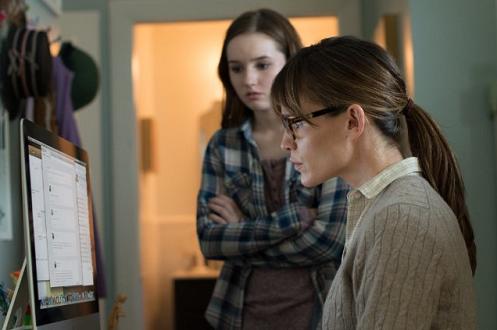
A better title for Men, Women & Children might be The Terrible, Horrible, No Good, Very Bad Internet. Another might be The Terrible, Horrible, No Good, Very Bad Movie.
I had hoped Jason Reitman's latest film would be up to the lofty standards of his best work, Juno and Up in the Air. But what could have been an insightful look at how the Internet has shaped our lives is instead a slight, heavy-handed and melodramatic cautionary tale about the dangers (at least from the film's point of view) that lurk online.
Shot in Austin, Men, Women & Children follows a group of teens and adults whose online activities land them in a heap of trouble. Among them are a mostly happy couple, Helen (Rosemarie DeWitt) and Don Truby (Adam Sandler), who let their sexual boredom get the better of them; Helen finds extramarital action thanks to hookup site Ashley Madison, and Don hires an escort after perusing his son's favorite porn sites.
Meanwhile, paranoid and overprotective mom Patricia Beltmeyer (Jennifer Garner) obsesses over the online activities of her daughter, Brandy (Kaitlyn Dever), monitoring her every text and Facebook post. (She even tracks the poor girl's whereabouts via her cell phone.) Despite her mom's spying and smothering, Brandy still manages to carry on a secret relationship with football star Tim Mooney (Ansel Elgort), who quits the team so he can devote more time to online role playing games.
Review: St. Vincent
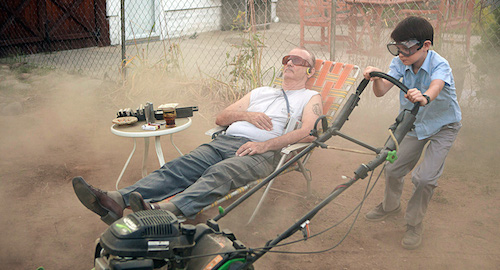
By the time St. Vincent draws to a close, you'll probably feel emotionally manipulated. You will have certainly realized that you've seen this story what feels like a million times before. If you're super nitpicky, you might even be inclined to make a list of films in the same vein that you like better (About A Boy and Rushmore immediately spring to mind). Unless you are as curmudgeonly as Vincent (Bill Murray) in this motion picture, I am betting you'll still find yourself giving in to this movie no matter how hard you resist.
As Vincent's new neighbor Maggie, Melissa McCarthy turns in a surprisingly subdued performance as a single mother struggling to keep things afloat for her her 12-year-old son Oliver (Jaeden Lieberher in an outstanding debut). Things get off to a very rocky start and they don't get much better when Oliver gets locked out of his new home on the first day of school and Maggie has to convince Vincent over the phone to babysit him until she can get off work. As the grumpiest of grumpy old men, it's not a task Vincent is well suited for, but he could use the money so he reluctantly agrees.
Review: The Overnighters
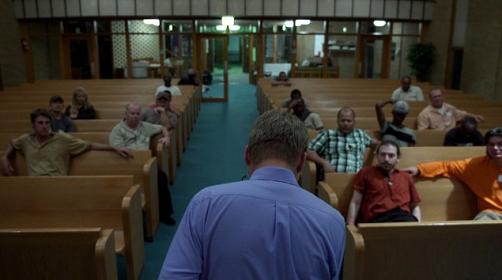
The searing documentary The Overnighters asks a lot of hard questions. The hardest may be, "What does community mean?"
Shot in Williston, North Dakota, filmmaker Jesse Moss's documentary -- which Drafthouse Films is releasing Friday in Austin -- captures the tiny town in the midst of the current North Dakota oil boom. The boom is a blessing and a curse: The townspeople welcome the unprecedented economic boost, but have mixed feelings about the influx of thousands of oil field workers.
The main problem is housing. Most new arrivals have nowhere to live, so many sleep in their cars, trucks and RVs, parked wherever they can. Another problem is less about logistics than human nature: The workers are roughnecks in every sense of the word -- desperately poor men, often with little education, all chasing quick money and some running from their pasts. To the good and decent citizens (in the ironic sense; more on this later) of Williston, the men are the others -- a scruffy, scary and unwelcome lot. The townspeople's hospitality ends where their fear begins.
The Overnighters focuses on Rev. Jay Reinke, a Lutheran pastor in Williston who opens his church as temporary housing for the workers. He does so because helping thy neighbor is one of his pastoral duties, of course; he's also immensely compassionate and nonjudgmental, a man who cares deeply about the often broken men who desperately seek the church's help. Far more than just their landlord, he's their counselor and friend.
Review: Kill the Messenger

'Tis the season for dark dramas, and Kill the Messenger may be this year's darkest, a film all the darker because it's based on a demoralizing true story.
The titular messenger is Gary Webb (Jeremy Renner), a San Jose Mercury News investigative reporter who in 1996 writes a series of articles alleging a link between the CIA and Nicaraguan cocaine smugglers in the 1980s. According to Webb's Dark Alliance series, the CIA knew that huge amounts of Nicaraguan coke were sold as crack cocaine in Los Angeles, and the profits were funneled back to the Contras, CIA-backed rebel groups fighting to overthrow the Nicaraguan government.
Webb does not allege that the CIA was directly involved in smuggling or selling crack. Instead, he says the agency aided the Contras by looking the other way, withholding evidence from the Justice Department and Congress, and shielding the smugglers and dealers from prosecution. Webb also alleges that the Nicaraguan cocaine sparked the crack epidemic that spread to many U.S. cities.
Fantastic Fest Review: Alleluia
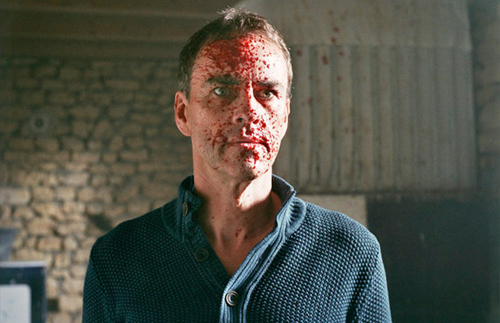
Freely adapted from the "stranger than fiction" true tale of Martha Beck and Raymond Fernandez (aka the "Honeymoon Killers" of the late 1940s), the movie Alleluia is a dark and twisted love story comprising four chapters titled for its female characters and centering around a specific crime. This is the second film in Fabrice du Welz’s trilogy about the Belgian Ardennes -- the first being the 2004 horror film Calvaire.
Gloria (Lola Dueñas) lives a fairly solitary life with her young daughter, with her primary companions ibeing the corpses that she prepares as a nurse in the morgue at a local hospital. Her friend Madeline (Stéphane Bissot) convinces her to go out with the handsome and charismatic Michel (Laurent Lucas), who she has found through an online dating site. It is quickly revealed that Michel is even worse than the men your friends warned you about on the Internet -- not only is he a gigolo taking money from women, but he is also psychotic.
Fantastic Fest Quick Reviews: When Animals Dream, In Order of Disappearance
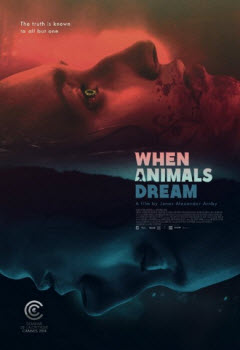 Here are a couple of capsule reviews from my time at Fantastic Fest this year: When Animals Dream and In Order of Disappearance. Both movies are set in winter in Nordic regions, so an overly air-conditioned movie theater is the ideal viewing experience (at least if you're in Austin).
Here are a couple of capsule reviews from my time at Fantastic Fest this year: When Animals Dream and In Order of Disappearance. Both movies are set in winter in Nordic regions, so an overly air-conditioned movie theater is the ideal viewing experience (at least if you're in Austin).
When Animals Dream (Når dyrene drømmer)
I went into When Animals Dream almost completely blind, and it's hard not to encourage you to do the same. The Danish film premiered at Cannes and is the feature directorial debut for Jonas Alexander Arnby.
Sonia Suhl stars as Marie, a teen girl just starting her first job in a fish-processing facility. She's drawn to a cute boy, and getting pranked by a total jerk. Her mom is nearly comatose, for reasons that slowly become evident. Marie has found a rash on her body and as the movie progresses, hair grows on the rash and in other incongruous places, and she has spells of snarling short temper. No one ever uses a word like "werewolf" ... because no one has to.
This movie unwinds very carefully, giving the audience pieces of information one at a time, presenting the tale in a spare way. Everything feels stripped down: Marie's unmade-up face, her economy with dialogue, the barren atmosphere of the small port town. And yet the movie is almost mesmerizing.
I've heard people comparing the movie to Let the Right One In, possibly because both are deliberately paced Scandinavian films about the undead's effect on everyday life -- a minimum of fantasy in what is often harsh reality. And yes, it's a fair comparison, although When Animals Dream does not feel derivative.
Review: Gone Girl
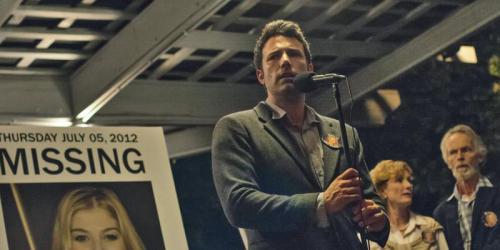
This review contains vague plot spoilers.
Gillian Flynn’s novel Gone Girl is a modern horror story about a marriage that goes dangerously, fascinatingly awry. A fast and satisfying read, the book’s smart dialogue and clever structure keep it from landing in trashy thriller territory even though the subject matter largely revolves around sex and scandal.
Flynn also wrote the screenplay for the film Gone Girl, doing an admirable job of keeping the guilty pleasure essence of the book intact while rearranging and splicing when necessary. It’s a tough trick to pull off, but she does it skillfully.
David Fincher is the well-chosen director of the film. Topics like obsession, manipulation and society’s continuous decay are right up Fincher’s alley, and his slick style and precise attention to detail are perfectly channeled into a story where every word and action carries weight and meaning.

